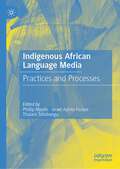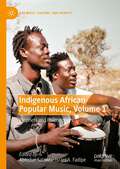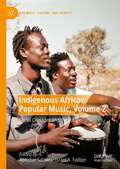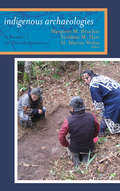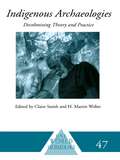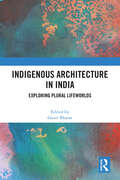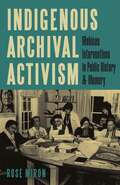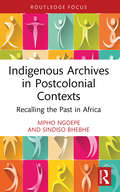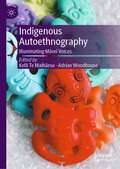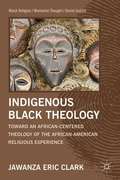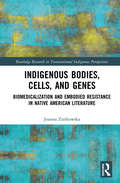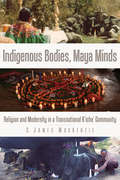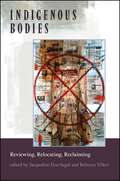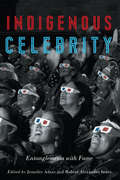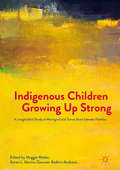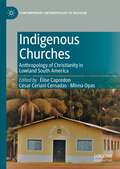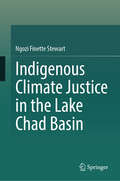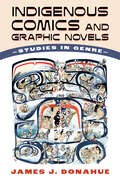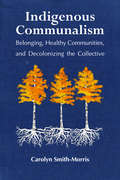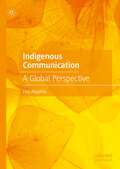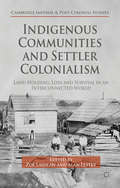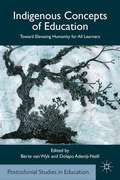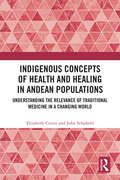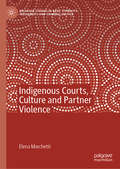- Table View
- List View
Indigenous African Knowledge Production
by Njoki Nathani-WaneThe Jie people of northern Uganda and the Turkana of northern Kenya have a genesis myth about Nayeche, a Jie woman who followed the footprints of a gray bull across the waterless plateau and who founded a "cradle land" in the plains of Turkana. In Remembering Nayeche and the Gray Bull Engiro, Mustafa Kemal Mirzeler shows how the poetic journey of Nayeche and the gray bull Engiro and their metaphorical return during the Jie harvest rituals gives rise to stories, imagery, and the articulation of ethnic and individual identities.Since the 1990s, Mirzeler has travelled to East Africa to apprentice with storytellers. Remembering Nayeche and the Gray Bull Engiro is both an account of his experience listening to these storytellers and of how oral tradition continues to evolve in the modern world. Mirzeler's work contributes significantly to the anthropology of storytelling, the study of myth and memory, and the use of oral tradition in historical studies.
Indigenous African Language Media: Practices and Processes
by Phillip Mpofu Thulani Tshabangu Israel Ayinla FadipeThe book contributes to the sparse academic literature on African and minority language media research. It serves as a compendium of experiences, activities and case studies on the use of native language media. Chapters in this book make theoretical, methodical and empirical contributions about indigenous African language media that are affected by structural factors of politics, technology, culture and economy and how they are creatively produced and appropriated by their audiences across African cultures and contexts. This book explores indigenous African language media about media representations, media texts and contents, practice-based activities, audience reception and participation, television, popular culture and cinema, peace and conflict resolution, health and environmental crisis communication, citizen journalism, ethnic and identity formation, beat analysis and investigative journalism, and corporate communication. There are hardly any similar works that focus on the various issues relating to this body of knowledge. The book provides a valuable companion for scholars in various fields like communication, media studies, African studies, African languages, popular culture, journalism, health and environmental communication.
Indigenous African Popular Music, Volume 1: Prophets and Philosophers (Pop Music, Culture and Identity)
by Abiodun Salawu Israel A. FadipeThis volume explores the nature, philosophies and genres of indigenous African popular music, focusing on how indigenous African popular music artistes are seen as prophets and philosophers, and how indigenous African popular music depicts the world. Indigenous African popular music has long been under-appreciated in communication scholarship. However, understanding the nature and philosophies of indigenous African popular music reveals an untapped diversity which only be unraveled by knowledge of the myriad cultural backgrounds from which its genres originate. Indigenous African popular musicians have become repositories of indigenous cultural traditions and cosmologies.With a particular focus on scholarship from Nigeria, Zimbabwe and South Africa, this volume explores the work of these pioneering artists and their protégés who are resiliently sustaining, recreating and popularising indigenous popular music in their respective African communities, and at the same time propagating the communal views about African philosophies and the temporal and spiritual worlds in which they exist.
Indigenous African Popular Music, Volume 2: Social Crusades and the Future (Pop Music, Culture and Identity)
by Abiodun Salawu Israel A. FadipeThis volume examines how African indigenous popular music is deployed in democracy, politics and for social crusades by African artists. Exploring the role of indigenous African popular music in environmental health communication and gender empowerment, it subsequently focuses on how the music portrays the African future, its use by African youths, and how it is affected by advanced broadcast technologies and the digital media. Indigenous African popular music has long been under-appreciated in communication scholarship. However, understanding the nature and philosophies of indigenous African popular music reveals an untapped diversity which can only be unraveled by the knowledge of myriad cultural backgrounds from which its genres originate. With a particular focus on scholarship from Nigeria, Zimbabwe and South Africa, this volume explores how, during the colonial period and post-independence dispensation, indigenous African music genres and their artists were mainstreamed in order to tackle emerging issues, to sensitise Africans about the affairs of their respective nations and to warn African leaders who have failed and are failing African citizenry about the plight of the people. At the same time, indigenous African popular music genres have served as a beacon to the teeming African youths to express their dreams, frustrations about their environments and to represent themselves. This volume explores how, through the advent of new media technologies, indigenous African popular musicians have been working relentlessly for indigenous production, becoming champions of good governance, marginalised population, and repositories of indigenous cultural traditions and cosmologies.
Indigenous Archaeologies: A Reader on Decolonization (One World Archaeology Ser. #Vol. 47)
by Margaret M. Bruchac Siobhan M. Hart H. Martin WobstThis comprehensive reader on indigenous archaeology shows that collaboration has become a key part of archaeology and heritage practice worldwide. Collaborative projects and projects directed and conducted by indigenous peoples independently have become standard, community concerns are routinely addressed, and oral histories are commonly incorporated into research. This volume begins with a substantial section on theoretical and philosophical underpinnings, then presents key articles from around the globe in sections on Oceania, North America, Mesoamerica and South America, Africa, Asia, and Europe. Editorial introductions to each piece contextualize them in the intersection of archaeology and indigenous studies. This major collection is an ideal text for courses in indigenous studies, archaeology, heritage management, and related fields.
Indigenous Archaeologies: Decolonising Theory and Practice (One World Archaeology #Vol. 47)
by H. Martin Wobst Claire SmithWith case studies from North America to Australia and South Africa and covering topics from archaeological ethics to the repatriation of human remains, this book charts the development of a new form of archaeology that is informed by indigenous values and agendas. This involves fundamental changes in archaeological theory and practice as well as substantive changes in the power relations between archaeologists and indigenous peoples. Questions concerning the development of ethical archaeological practices are at the heart of this process.
Indigenous Architecture in India: Exploring Plural Lifeworlds
by Gauri BharatThis volume focuses on socio- spatial practices of indigenous communities in India. It explores the interrelation between the built environments and lifeworlds, i.e. practices, patterns, and structures of everyday life. The chapters deal with different ideas and definitions of indigeneity, while also addressing the complex equations between the production and perception of built forms, indigenous technologies, on the one hand, and social, environmental and political contexts, questions of aesthetics, identity, and self-representation on the other.From Adivasi art and sacred sites to craft villages and nomadic pastoralists in western India, from indigenous bangle makers in urban north India to terracotta crafts people on the south, each chapter focuses on different communities and the contours of their contemporary lifeworlds. The contributions actively attempt to foreground the logic and perspectives of the communities themselves as the epistemological centre of the architectural and material discourses on indigeneity.This book will be useful for students, teachers, and researchers of architecture, urban design, urban studies, urban development and planning, anthropology, sociology, and museum studies. It will also be of interest to urban planners and designers, policy planners, local government authorities, and professionals engaged in the discipline.
Indigenous Archival Activism: Mohican Interventions in Public History and Memory
by Rose MironWho has the right to represent Native history? The past several decades have seen a massive shift in debates over who owns and has the right to tell Native American history and stories. For centuries, non-Native actors have collected, stolen, sequestered, and gained value from Native stories and documents, human remains, and sacred objects. However, thanks to the work of Native activists, Native history is now increasingly being repatriated back to the control of tribes and communities. Indigenous Archival Activism takes readers into the heart of these debates by tracing one tribe&’s fifty-year fight to recover and rewrite their history. Rose Miron tells the story of the Stockbridge-Munsee Mohican Nation and their Historical Committee, a group of mostly Mohican women who have been collecting and reorganizing historical materials since 1968. She shows how their work is exemplary of how tribal archives can be used strategically to shift how Native history is accessed, represented, written and, most importantly, controlled. Based on a more than decade-long reciprocal relationship with the Stockbridge-Munsee Mohican Nation, Miron&’s research and writing is shaped primarily by materials found in the tribal archive and ongoing conversations and input from the Stockbridge-Munsee Historical Committee. As a non-Mohican, Miron is careful to consider her own positionality and reflects on what it means for non-Native researchers and institutions to build reciprocal relationships with Indigenous nations in the context of academia and public history, offering a model both for tribes undertaking their own reclamation projects and for scholars looking to work with tribes in ethical ways.
Indigenous Archives in Postcolonial Contexts: Recalling the Past in Africa
by Mpho Ngoepe Sindiso BhebheIndigenous Archives in Postcolonial Contexts revisits the definition of a record and extends it to include memory, murals, rock art paintings and other objects. Drawing on five years of research and examples from Zimbabwe, Botswana and South Africa, the authors analyse archives in the African context. Considering issues such as authentication, ownership and copyright, the book considers how murals and their like can be used as extended or counter archives. Arguing that extended archives can reach people in a way that traditional archives cannot and that such archives can be used to bridge the gaps identified within archival repositories, the authors also examine how such archives are managed and authenticated using traditional archival principles. Presenting case studies from organisations such as Gay and Lesbian Memory in Action Archives (GALA) and heritage projects such as the Makgabeng Open Cultural Museum, the authors also analyse Indigenous family praises and songs and explore how such records are preserved and transmitted to the next generation. Indigenous Archives in Postcolonial Contexts demonstrates how the voices of the marginalised can be incorporated into archives. Making an important contribution to the effort to decolonise African archives, the book will be essential reading for academics and students working in archival studies, library and information science, Indigenous studies, African studies, cultural heritage, history and anthropology.
Indigenous Autoethnography: Illuminating Māori Voices
by Kelli Te Maihāroa Adrian WoodhouseThis book opens new pathways for decolonial autoethnography, presented as a series of reflective stories that showcase how Māori have negotiated and navigated their personal and professional identities within contemporary society. Framed within the academic methodology of Indigenous Autoethnography, authors recount their personal and professional experiences to address their encounters with cultural trauma and personal enlightenment. As a culturally responsive methodology, Indigenous Autoethnography embraces reflective practice and critical awakening to validate Indigenous knowledge, ensuring that it remains meaningful and responsive to the needs of Māori. Utilising metaphorical storytelling as a primary means of sensemaking, this work reinforces the importance of Māori and other Indigenous People to seek wisdom from the past to guide them into the future. With Indigenous knowledge historically ignored and misrepresented in higher education, this seminal text provides invaluable guidance for global Indigenous researchers seeking to produce story work that genuinely encompasses physical, emotional, and spiritual dimensions.
Indigenous Black Theology
by Jawanza Eric ClarkThis work is concerned with the way Black Christian formation, because of the acceptance of universal, absolute, and exclusive Christian doctrines, seems to justify and even encourage anti-African sentiment.
Indigenous Bodies, Cells, and Genes: Biomedicalization and Embodied Resistance in Native American Literature (Routledge Research in Transnational Indigenous Perspectives)
by Joanna ZiarkowskaThis book explores Native American literary responses to biomedical discourses and biomedicalization processes as they circulate in social and cultural contexts. Native American communities resist reductivism of biomedicine that excludes Indigenous (and non-Western) epistemologies and instead draw attention to how illness, healing, treatment, and genetic research are socially constructed and dependent on inherently racialist thinking. This volume highlights how interventions into the hegemony of biomedicine are vigorously addressed in Native American literature. The book covers tuberculosis and diabetes epidemics, the emergence of Native American DNA, discoveries in biotechnology, and the problematics of a biomedical model of psychiatry. The book analyzes work by Louise Erdrich, Sherman Alexie, LeAnne Howe, Linda Hogan, Heid E. Erdrich, Elissa Washuta and Frances Washburn. The book will appeal to scholars of Native American and Indigenous Studies, as well as to others with an interest in literature and medicine.
Indigenous Bodies, Maya Minds: Religion and Modernity in a Transnational K'iche' Community (IMS Culture and Society)
by C. James MacKenzieIndigenous Bodies, Maya Minds examines tension and conflict over ethnic and religious identity in the K’iche’ Maya community of San Andrés Xecul in the Guatemalan Highlands and considers how religious and ethnic attachments are sustained and transformed through the transnational experiences of locals who have migrated to the United States. Author C. James MacKenzie explores the relationship among four coexisting religious communities within Highland Maya villages in contemporary Guatemala—costumbre, traditionalist religion with a shamanic substrate; “Enthusiastic Christianity,” versions of Charismaticism and Pentecostalism; an “inculturated” and Mayanized version of Catholicism; and a purified and antisyncretic Maya Spirituality—with attention to the modern and nonmodern worldviews that sustain them. He introduces a sophisticated set of theories to interpret both traditional religion and its relationship to other contemporary religious options, analyzing the relation among these various worldviews in terms of the indigenization of modernity and the various ways modernity can be apprehended as an intellectual project or an embodied experience. Indigenous Bodies, Maya Minds investigates the way an increasingly plural religious landscape intersects with ethnic and other identities. It will be of interest to Mesoamerican and Mayan ethnographers, as well as students and scholars of cultural anthropology, indigenous cultures, globalization, and religion.
Indigenous Bodies: Reviewing, Relocating, Reclaiming
by Jacqueline Fear-Segal Rebecca TillettThis interdisciplinary collection of essays, by both Natives and non-Natives, explores presentations and representations of indigenous bodies in historical and contemporary contexts. Recent decades have seen a wealth of scholarship on the body in a wide range of disciplines. Indigenous Bodies extends this scholarship in exciting new ways, bringing together the disciplinary expertise of Native studies scholars from around the world. The book is particularly concerned with the Native body as a site of persistent fascination, colonial oppression, and indigenous agency, along with the endurance of these legacies within Native communities. At the core of this collection lies a dual commitment to exposing numerous and diverse disempowerments of indigenous peoples, and to recognizing the many ways in which these same people retained and/or reclaimed agency. Issues of reviewing, relocating, and reclaiming bodies are examined in the chapters, which are paired to bring to light juxtapositions and connections and further the transnational development of indigenous studies.
Indigenous Celebrity: Entanglements with Fame
by Jennifer Adese and Robert Alexander Innes;editorsIndigenous Celebrity speaks to the possibilities, challenges, and consequences of popular forms of recognition, critically recasting the lens through which we understand Indigenous people’s entanglements with celebrity. It presents a wide range of essays that explore the theoretical, material, social, cultural, and political impacts of celebrity on and for Indigenous people. It questions and critiques the whitestream concept of celebrity and the very juxtaposition of “Indigenous” and “celebrity” and casts a critical lens on celebrity culture’s impact on Indigenous people. Indigenous people who willingly engage with celebrity culture, or are drawn up into it, enter into a complex terrain of social relations informed by layered dimensions of colonialism, racism, sexism, homophobia/transphobia, and classism. Yet this reductive framing of celebrity does not account for the ways that Indigenous people’s own worldviews inform Indigenous engagement with celebrity culture––or rather, popular social and cultural forms of recognition. Indigenous Celebrity reorients conversations on Indigenous celebrity towards understanding how Indigenous people draw from nation-specific processes of respect and recognition while at the same time navigating external assumptions and expectations. This collection examines the relationship of Indigenous people to the concept of celebrity in past, present, and ongoing contexts, identifying commonalities, tensions, and possibilities.
Indigenous Children Growing Up Strong
by Maggie Walter Karen L. Martin Gawaian Bodkin-AndrewsThis edited collection by leading Australian Aboriginal scholars uses data from the Longitudinal Study of Indigenous Children (LSIC) to explore how Aboriginal and Torres Strait Islander children are growing up in contemporary Australia. The authors provide an overview of the study, including the Indigenous methodological and ethical framework which guides the analysis. They also address the resulting policy ramifications, alongside the cultural, social, educational and family dynamics of Indigenous children's lives. Indigenous Children Growing Up Strong will be of interest to students and scholars in the areas of sociology, social work, anthropology and childhood and youth studies.
Indigenous Churches: Anthropology of Christianity in Lowland South America (Contemporary Anthropology of Religion)
by Minna Opas Élise Capredon César Ceriani CernadasThis book raises the question of what an Indigenous church is and how its members define their ties of affiliation or separation. Establishing a pioneering dialogue between Amazonian and Gran Chaco studies on Indigenous Christianity, the contributions address historical processes, cosmological conceptions, ritual practices, leadership dynamics, and material formations involved in the creation and diversification of Indigenous churches. Instead of focusing on the study of missionary ideologies and praxis, the book explores Indigenous peoples' interpretations of Christianity and the institutional arrangements they make to create, expand, or dismantle their churches. In doing so, the volume offers a South American contribution to the theoretical project of the anthropology of Christianity, especially as it relates to the issue of denominationalism and inter-denominational relations.
Indigenous Climate Justice in the Lake Chad Basin
by Ngozi Finette StewartThis volume aims to highlight Indigenous knowledge toward climate mitigation with a focus on peoples in Sub-Saharan Africa, an underpublished region vis a vis this topic. The term &“climate justice&” has emerged to explain how vulnerable, marginalized, and disadvantaged groups - often those who are least responsible for climate change caused by (often colonially induced) environmental damage, tend to suffer its gravest impacts. Indigenous climate justice efforts show promise in contributing to managing global climate change and its impact on vulnerable groups, especially Indigenous Peoples. To contribute to the advancement of research in this area, this book examines intersectional approaches to climate justice and explores how the varies ideas and methods from Indigenous Peoples in Sub-Saharan Africa can contribute to policies on climate change adaptation. Aspects of Indigenous knowledge that are examined within the context of climate justice include natural resource management; governance; conservation and gendered impact of climate change; food sovereignty and health.
Indigenous Comics and Graphic Novels: Studies in Genre
by James J. DonahueIn recent years, studios like Marvel and DC have seen enormous success transforming comics into major motion pictures. At the same time, bookstores such as Barnes & Noble in the US and Indigo in Canada have made more room for comic books and graphic novels on their shelves. Yet despite the sustained popular appeal and the heightened availability of these media, Indigenous artists continue to find their work given little attention by mainstream publishers, booksellers, production houses, and academics. Nevertheless, Indigenous artists are increasingly turning to graphic narratives, with publishers like Native Realities LLC and Highwater Press carving out ever more space for Indigenous creators. In Indigenous Comics and Graphic Novels: Studies in Genre, James J. Donahue aims to interrogate and unravel the disparities of representation in the fields of comics studies and comics publishing. Donahue documents and analyzes the works of several Indigenous artists, including Theo Tso, Todd Houseman, and Arigon Starr. Through topically arranged chapters, the author explores a wide array of content produced by Indigenous creators, from superhero and science fiction comics to graphic novels and experimental narratives. While noting the importance of examining how Indigenous works are analyzed, Donahue emphasizes that the creation of artistic and critical spaces for Indigenous comics and graphic novels should be an essential concern for the comics studies field.
Indigenous Communalism: Belonging, Healthy Communities, and Decolonizing the Collective
by Carolyn Smith-MorrisFrom a grandmother’s inter-generational care to the strategic and slow consensus work of elected tribal leaders, Indigenous community builders perform the daily work of culture and communalism. Indigenous Communalism conveys age-old lessons about culture, communalism, and the universal tension between the individual and the collective. It is also a critical ethnography challenging the moral and cultural assumptions of a hyper-individualist, twenty-first century global society. Told in vibrant detail, the narrative of the book conveys the importance of communalism as a value system present in all human groups and one at the center of Indigenous survival. Carolyn Smith-Morris draws on her work among the Akimel O'odham and the Wiradjuri to show how communal work and culture help these communities form distinctive Indigenous bonds. The results are not only a rich study of Indigenous relational lifeways, but a serious inquiry to the continuing acculturative atmosphere that Indigenous communities struggle to resist. Recognizing both positive and negative sides to the issue, she asks whether there is a global Indigenous communalism. And if so, what lessons does it teach about healthy communities, the universal human need for belonging, and the potential for the collective to do good?
Indigenous Communication: A Global Perspective
by Eno AkpabioThis book explores global forms of indigenous communication and their connections with new and digital media. With fresh and original insights, the book transcends the confines of regional analysis to investigate similarities, parallels, and differences present in indigenous communication practices around the world.Through a systematic classification of these diverse methods, including music, myths, iconography, visual, institutional, and axiomatic communication, the author draws comparisons between geographically and historically disparate contexts. Indigenous Communication provides a rigorous conceptual clarification of indigenous forms of communication, both showcasing their various manifestations, and illuminating their relevance and transformative potential in the digital age.
Indigenous Communities and Settler Colonialism
by Alan Lester Zoë LaidlawThe new world created through Anglophone emigration in the 19th century has been much studied. But there have been few accounts of what this meant for the Indigenous populations. This book shows that Indigenous communities tenaciously held land in the midst of dispossession, whilst becoming interconnected through their struggles to do so.
Indigenous Concepts Of Education
by Berte Van Wyk Dolapo Adeniji-NeillFeaturing in-depth examinations of concepts of knowing, learning, and education from a range of cultures worldwide, this book offers a rich theory of indigenous concepts of education, their relation to Western concepts, and their potential for creating education that articulates the aspirations of communities and fosters humanity for all learners.
Indigenous Concepts of Health and Healing in Andean Populations: Understanding the Relevance of Traditional Medicine in a Changing World
by John Schofield Elizabeth CurrieThis book uses archaeology and ethnohistory to explore the evidence for the survival of ancestral beliefs and practices related to health and healing in Indigenous Andean communities.The authors argue that through determining the nature of the survival of beliefs around health and healing, important insights are gained into how people develop adaptive strategies for survival in a way that allows a continuity of identity and integrity. The book works through various stages of research to arrive at its conclusions. Firstly, through archaeology and ethnohistory, it establishes a ‘baseline’ of key ancestral (pre-European) Indigenous Andean beliefs related to health, illness and healing. It then proceeds to review the evidence for the survival of these ancestral beliefs and practices related to Indigenous pre-European Andean epistemologies and ontologies. Analysing the results of the first two sections, the final part reflects on the narratives around ancestral beliefs and practices and how they influence lived experience in the contemporary world. In essence, this book deals with the question 'How do people manage change?', a universal question relevant to humanity at any time, and stresses the need to recognise the significance of cultural diversity, intangible heritage and plurality.This interdisciplinary study is for researchers in ethnohistory, anthropology, medical anthropology, archaeology, history, heritage and Indigenous studies.
Indigenous Courts, Culture and Partner Violence (Palgrave Studies in Race, Ethnicity, Indigeneity and Criminal Justice)
by Elena MarchettiThis book examines the use and impact of Australian indigenous sentencing courts in response to indigenous partner violence. In operation in Australia since 1999, these courts were first established by a magistrate in South Australia who sought to improve court communication and understanding, and trust in the criminal justice system for indigenous people. Indigenous Courts, Culture and Partner Violence is the first book to consider how the transformation of a sentencing process into one that better reflects indigenous cultural values can improve outcomes for both victims and offenders of indigenous partner violence. It asks which aspects of the sentencing process are most important in influencing a change in attitude and behaviour of indigenous offenders who repeatedly engage in abusive behaviour towards their partner, and what types of justice process better meets the relationship, rehabilitative and safety needs of indigenous partner violence offenders and their victims?Marchetti examines the adaptation of a formal sentencing process to make it more culturally meaningful when responding to indigenous partner violence, and gauges victim and offender views about how the court process has affected their lives and relationships, and elicits their views of violence within their communities. This innovative work will be of great interest to academics, researchers, policy makers, police, lawyers, family violence service providers and students.

